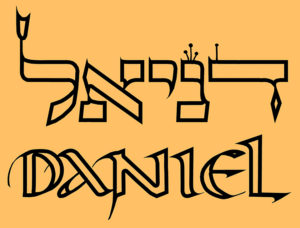Daniel, Chief of Wise Men – a Hebrew Magi?
Magi from the East, known by a name that is the root word for “magic,” seems to be a complete juxtaposition to a Jewish Messiah account about Jesus of Nazareth. Perhaps surprisingly, there is a Jewish connection with these mystics from the East.
King Nebuchadnezzar of Babylon had wiped out Jerusalem, raided the Temple, and ended the House of David’s succession of sitting kings. Treasures taken as spoils of war included Hebrew people with particular desired qualities.[1]
 As a captured Hebrew lad, Daniel and three other Hebrew boys were chosen to be educated in the school for Chaldeans to serve King Nebuchadnezzar. Known as the chakkiym, Nebuchadnezzar’s royal council was an eclectic cabal consisting of “the magicians, the astrologers, the sorcerers, and the Chaldeans.”[2]
As a captured Hebrew lad, Daniel and three other Hebrew boys were chosen to be educated in the school for Chaldeans to serve King Nebuchadnezzar. Known as the chakkiym, Nebuchadnezzar’s royal council was an eclectic cabal consisting of “the magicians, the astrologers, the sorcerers, and the Chaldeans.”[2]
Chakkiym literally means “wise men” or simply “wise.”[3] Two other words, Aramaic kisday and Hebrew Kisdiy, each having the same meaning of “Clod-breaker” or interchangeably translated as “Chaldean.”[4] Kisday appears in the Bible only in the first five chapters of the Book of Daniel.
One day Nebuchadnezzar challenged the chakkiym to interpret his dream.[5] Gladly they agreed … of course, once Nebuchadnezzar revealed his dream to them.
Suspicious, the king said that if the chakkiym truly had mystical powers, they should be able to know the dream itself as well as its interpretation. Under the threat of death and destruction, the chakkiym were commanded to reveal both the dream and its interpretation.
Realizing they were backed into a corner, the Chaldeans informed the King that his request was impossible because no one could do what he was asking. In a fit of rage, Nebuchadnezzar ordered all the chakkiym to be executed.
All this was unknown to Daniel until Arioch, captain of the King’s guard, came to arrest and execute him as one of the kingdom’s chakkiym. Surprised by this nasty, unexpected turn of events, Daniel asked Arioch for details and then convinced him to be allowed to approach the King.
Nebuchadnezzar granted a days’ reprieve and that night Daniel with his friends prayed for the revelation of the dream. Next day, Daniel said to King Nebuchadnezzar, “The secret which the king has demanded, the wise men, the astrologers, the magicians, and the soothsayers cannot declare to the king. But there is a God in heaven who reveals secrets…”[6]
Daniel then revealed both the King’s dream and its interpretation. Completely humbled, Nebuchadnezzar was in awe and the King bowed down to Daniel, then rewarded him with riches and authority.
Nebuchadnezzar then made Daniel head of all the kingdom’s chakkiym.[7] According to the prophet Jeremiah, the name for this chief position of the wise men in Babylon was called Rab-mag.[8]
Hebrew Word Study defines the word Rab-mag as “a foreign word for Magian.” Strong’s definition is “a foreign word for a Magian; chief Magian; Rab-Mag, a Babylonian official.”[9]
Years later, handwriting on the palace wall appeared during Babylonian ruler Belshazzar’s drunken party. At the urging of Belshazzar’s wife, Daniel was summoned to interpret the message.
Daniel’s interpretation of the message foretold the Babylonian kingdom would be overthrown – it happened that very night.[10] It is the last time the word chakkiym appears in the Bible.[11]
Chaldeans did not disappear with the takeover by the Persians. Over the 500 years before the birth of Jesus of Nazareth, abilities and skills of the Chaldeans were recognized by the Persians, the Greeks and the Romans.
Wise men Chaldeans and Persians sages meshed well with their mystical reputations. Daniel’s reputation in Babylon landed him in a position as a top leader in the Persian kingdom ruled by King Cyrus, foretold by prophet Isaiah.[12]
Cyrus, aka Cyrus II or Cyrus the Great (580 – c. 529), King of the Persian Empire, espoused Zoroastrianism as the main religion.[13] Zoroastrian priests known as Magi, like the chakkiym, were viewed as wise men and considered to have great royal influence in political affairs.[14]
Pythagoras (c. 570-499 BC), a Greek philosopher and mathematician said he “journeyed among the Chaldaeans and Magi” to learn their ways.[15] Xenophon (c. 430-350 BC), a Greek intellect, wrote of Cyrus’s rule, “Influences of the Magi, continued in force with each successive king even to this day.”[16]
Herodotus (c. 484-420 BC), a Greek historian, gave an account corroborated by historian Flavius Josephus of a Magus who attempted a silent coup through trickery. It paved the way to Darius ultimately to become a Persian ruler.[17]
Darius, aka Darius I or Darius the Great (522-486 BC), assigned Daniel as one of the three top government positions over the satraps (province governors and chiefs) with the intention to place Daniel as administrator over all of them.[18] His two jealous counterparts conspired to have Daniel eliminated setting the stage for the famed story of Daniel in the lion’s den.
Other noted Hellenistic era Greeks provided additional insights to these mysterious wise men of Babylon and Persia.[19] Accounts of Chaldeans and Magi reveal striking similarities between them.[20]
Plato (circa 428-347 BC), the famed Greek philosopher, called the Magi “king-makers.” He also wrote that a king’s son at the age of 14 is taught “the magian lore of Zoroaster.”[21]
Cicero (106-43 BC), the famed Roman orator and lawyer, identified Magi as Persians.[22] Roman Historian Diodorus (c. 75-20 BC) wrote, “the Chaldeans in Babylon and the other astrologers succeed in making accurate prophecies.”[23]
Coexisting with the Roman Empire at the end of the millennium was the Parthian Empire. Considered by some to be the second Persian Empire, the Parthians also treated wise men and Magi with high regard.[24]
Renowned Greek historian, Strabo (c. 64 BC – 21 AD) lived in the same era as Jesus of Nazareth. He referenced Poseidonius, a Greek philosopher, saying “the Council of the Parthians, according to Poseidonius, consists of two groups, one that of kinsmen, and the other that of wise men and Magi, from both of which groups the kings were appointed.”[26]
“And the priests of the Egyptians, the Chaldeans, and Magi, distinguished for their wisdom above those around them, obtained from our predecessors honour and authority…” – Strabo [27]
Throughout the centuries, Magi and Chaldean wise men had a reputation for their ability to forecast the future, as king-makers, and their astronomy abilities. When the Magi came to the Jerusalem palace of Herod, without hesitation the King granted them immediate access and did not question their request.
MT 2:2 “Where is He who has been born King of the Jews?” the Magi asked, because they had “seen his star and came to worship him.” (NASB, NKJV)
Daniel was a top official, a Rab-mag, in the Babylonian and in the Persian Empires. Can the conclusion be drawn that Daniel was a Hebrew Magi?
Updated January 6, 2025.
This work is licensed under a Creative Commons Attribution-NonCommercial-NoDerivatives 4.0 International License.
REFERENCES:
[1] Daniel 1. CR Jeremiah 22:25; Habakkuk 1:6.
[2] Daniel 2:2. NKJV. “How Accurate is the Calendar at this Website?” Church of God Study Forum.n.d. <http://www.cgsf.org/dbeattie/calendar/about> Cohen, Stephen. Calligraphy. “Daniel.” photo. 2016. <https://images.search.yahoo.com/yhs/search;_ylt=AwrEePCFCi5jwWoAmwcPxQt.;_ylu=Y29sbwNiZjEEcG9zAzEEdnRpZAMEc2VjA3BpdnM->?p=hebrew+Daniel+images&type=sdff_9527_FFW_ZZ&hsimp=yhs-3&hspart=iba&grd=1&ei=UTF-8&fr=yhs-iba-3#id=1&iurl=http%3A%2F%2Fwww.judaicalligraphy.com%2FDaniel.jpg&action=click>
[3] Daniel 2:12. Net.bible.org. Hebrew text. “chakkiym 02445.” 2445. LexiConcordance.c0m.
[4] Daniel 1:4. Net.bible.org. Hebrew text. kasdiy <03778> Daniel 2:12. Net.bible.org. Hebrew text. “kasday <3779>” 3778. LexiConcordance.c0m. 3779 LexiConcordance.c0m. Guisepi, Robert. “The Chaldeans, The Chaldeans (Neo-Babylonian) Empire.” International World History Project. Ed. Robert A. Guisepi. 2007. <http://history-world.org/chaldeans.htm> “Chaldea.” Encyclopædia Britannica. 2018. <https://www.britannica.com/place/Chaldea>
[5] Daniel 2.
[6] Daniel 2:27. NKJV.
[7] Daniel 2:46-48.
[8] Jeremiah 39:3, 13.
[9] RabMag H72348. Hebrew Bible Lexicon. http://lexiconcordance.com/search6.asp?sw=7248&sm=0&x=29&y=12>
[10] Daniel 5. CR Isaiah 13; Jeremiah 25:12. Herodotus. The Histories. 1.191-193; 4.1. <http://www.perseus.tufts.edu/hopper/text?doc=Perseus%3Atext%3A1999.01.0126%3Abook%3D1%3Achapter%3D1>
[11] Daniel 5:15.
[12] Isaiah 45:1; Daniel 6. CR Daniel 9, 10.
[13] Hooker, Richard. “Mesopotamia: The Persians.” Washington State University. 1996. <http://web.archive.org/web/20110514001358/http://www.wsu.edu/~dee/MESO/PERSIANS.HTM> CYRUS ii. Cyrus I. Encyclopædia Iranica. 2021. <https://www.iranicaonline.org/articles/cyrus-ii> Cyrus. JewishEncyclopedia.com. <https://jewishencyclopedia.com/articles/4828-cyrus> Cyrus the Great. Encyclopedia Britannica. 2021. <https://www.britannica.com/biography/Cyrus-the-Great> “Zoroastrianism.” ReligionFacts.com. 2018. <http://www.religionfacts.com/zoroastrianism/index.htm> “Zoroastrianism.” PersianEmpire.info. 2007. <http://persianempire.info/zoro.htm> Hooker, Richard. “Mesopotamia: The Persians.” Washington State University. 1996. <http://web.archive.org/web/20110514001358/http://www.wsu.edu/~dee/MESO/PERSIANS.HTM> “Zoroaster.” Encyclopædia.com. 2016. <https://www.encyclopedia.com/people/philosophy-and-religion/ancient-religion-biographies/zoroaster> Gascoigne, Bamber. “History of Zoroastrianism.” HistoryWorld.net. n.d. <http://www.historyworld.net/wrldhis/PlainTextHistories.asp?historyid=ab71> “Zoroastrianism.” BBC|The British Broadcasting Corporation. 2009. <http://www.bbc.co.uk/religion/religions/zoroastrian> Eduljee, K. E. “Greek Perceptions of Zoroaster, Zoroastrianism & the Magi.” Zoroastrian Heritage. 2011. <http://zoroastrianheritage.blogspot.com/2011/04/greek-perceptions-of-zoroaster.html> “Zoroastrianism.” BBC|The British Broadcasting Corporation. 2009. “The Archaemenian.”<http://www.bbc.co.uk/religion/religions/zoroastrian> Jafarey, Ali Akbar. “The Achaemenians, Zoroastrians in Transition.” CAIS|The Circle of Ancient Iranian Studies. 1998. <http://www.cais-soas.com/CAIS/Religions/iranian/Zarathushtrian/achaemenian_zarathushtrian.htm> Soules, Jeremiah. “For the Glory of Ahuramazda: The Political Effects of Zoroastrianism on Early Achaemenid Persia.” University of Wisconsin – Eau Claire. 2010. pp. 18-21. <http://minds.wisconsin.edu/handle/1793/60912?show=full>
[14] Herodotus, The Histories. Book 3, Chapters 30, 60-79. <http://www.perseus.tufts.edu/hopper/text?doc=Perseus:text:1999.01.0126:book=3:chapter=30&highlight=smerdis > Plato. Republic. Book 9, section 572e. <http://www.perseus.tufts.edu/hopper/text?doc=Perseus:text:1999.01.0168:book=9:section=572e&highlight=magi>
[15] Laertius, Diogenes. Lives of Eminent Philosophers. 8.1; 9/7. <http://www.perseus.tufts.edu/hopper/text?doc=Perseus:text:1999.01.0258:book=9:chapter=7&highlight=Magians%2C> “Pythagoras.” Encyclopædia Britannica. 2018. https://www.britannica.com/biography/Pythagoras> “Cyrus takes Babylon.” Livius.org. Ed. Jona Lendering. 2018. <http://www.livius.org/sources/content/herodotus/cyrus-takes-babylon>
[16] Xenophon. Cyropaedia. Walter Miller, Ed. c.370 BC. 4.5; .8.1. <http://www.perseus.tufts.edu/hopper/text?doc=Xen.+Cyrop.+1.1&fromdoc=Perseus%3Atext%3A1999.01.0204>“Xenophon.” Encyclopædia Britannica. 2018. https://www.britannica.com/biography/Xenophon>
[17] Herodotus. Histories. Josephus, Flavius. Antiquities of the Jews. n.d, Book XI, Chapter III. <http://books.google.com/books?id=e0dAAAAAMAAJ&printsec=frontcover&source=gbs_ge_summary_r&cad=0#v=onepage&q&f=false> Josephus, Flavius. Antiquities of the Jews. Book XI, Chapter III. n.d. <http://books.google.com/books?id=e0dAAAAAMAAJ&printsec=frontcover&source=gbs_ge_summary_r&cad=0#v=onepage&q&f=false>
[18] Daniel 6:2-3. Darius I. Encyclopædia Britannica. 2021. <https://www.britannica.com/biography/Darius-I> Darius I. JewishEncyclopedia.com <https://jewishencyclopedia.com/articles/4902-darius-i> Darius iii. Darius I the Great. Encyclopædia Iranica. 2021. <https://www.iranicaonline.org/articles/darius-iii> Darius I. Encyclopædia Britannica. 2021. <https://www.britannica.com/biography/Darius-I> Daniel 6. Herodotus. Histories. 3.90. Xenophon. Cyropaedia. 4.5.> “The Book of Daniel.” ATPCM. photo. 2019. <https://shelleybos.blogspot.com/2019/08/the-book-of-daniel-full-biblical-movie.html>
[19] Gascoigne, Bamber. “Iran (Persia) timeline.” HistoryWorld.net. n.d. <http://www.historyworld.net/timesearch/default.asp?conid=static_timeline&timelineid=759&page=1&keywords=Iran+%28Persia%29+timeline> Eduljee. “Greek Perceptions of Zoroaster, Zoroastrianism & the Magi.”>
[20] “Democritus.” Encyclopædia Britannica. 2018. <https://www.britannica.com/biography/Democritus> Diogenes. Lives. 9.7.>
[21] Plato. Republic. Trans.Paul Shorey. 9.572e. <http://www.perseus.tufts.edu/hopper/text?doc=Perseus%3Atext%3A1999.01.0168%3Abook%3D9%3Asection%3D572e> Plato. Alcibiades 1. Trans. W.R.M. Lamb. c. 390 AD. 1 121e-1232. <http://www.perseus.tufts.edu/hopper/text?doc=Perseus%3Atext%3A1999.01.0176%3Atext%3DAlc.%201%3Asection%3D122a> “Plato.” Encyclopædia Britannica. 2018. <https://www.britannica.com/biography/Plato>
[22] Cicero, M. Tullius. Divination. Trans. William Armistead Falconer. 44 BC. 1.46. <http://www.perseus.tufts.edu/hopper/text?doc=Perseus%3Atext%3A2007.01.0043%3Abook%3D1%3Asection%3D46> Cicero. Divinations. 1.2.
[23] Diodorus. Library. Prologue; 15.50. “Diodorus Siculus.” Encyclopædia Britannica. 2018. <https://www.britannica.com/biography/Diodorus-Siculus> CR. Diodorus Siculus. Persus Tufts. “Library.” Book 17, Chapter 112. Section 1, #2. n.d. <http://www.perseus.tufts.edu/hopper/text?doc=Perseus%3Atext%3A1999.01.0084%3Abook%3D17%3Achapter%3D112%3Asection%3D2> Diogenes. Lives of Eminent Philosophers. “Prologue.”#2. <http://www.perseus.tufts.edu/hopper/text?doc=Perseus:text:1999.01.0258:book=1:chapter=prologue&highlight=zoroaster>
[24] Lendering, Jona. History of Iran – Parthian Empire. 2018. <http://www.iranchamber.com/history/parthians/parthians.php>
<http://www.perseus.tufts.edu/hopper/text?doc=Perseus%3Atext%3A2007.01.0043%3Abook%3D1%3Asection%3D2> Cicero. Divinations. 1.90 <http://www.perseus.tufts.edu/hopper/text?doc=Perseus%3Atext%3A2007.01.0043%3Abook%3D1%3Asection%3D90>
[25] Pasidonius of Rhodes. MT MacTutor. April 1999. <https://mathshistory.st-andrews.ac.uk/Biographies/Posidonius> Poseidonius. Britannica.com. <https://www.britannica.com/biography/Poseidonius>
[26] Lendering, Jona. History of Iran – Parthian Empire. 2018. <http://www.iranchamber.com/history/parthians/parthians.php> CR Poseidonius. Britannica.com.
[27] Strabo. The Geography of Strabo. 17-23 AD. H. L. Jones, ed. 1.2. <http://www.perseus.tufts.edu/hopper/text?doc=Perseus:text:1999.01.0239:book=1:chapter=2&highlight=magi>

